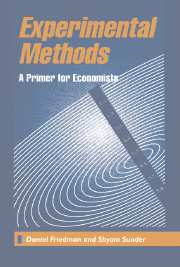Book contents
- Frontmatter
- Contents
- List of figures and tables
- Preface
- Acknowledgments
- EXPERIMENTAL METHODS
- 1 Introduction
- 2 Principles of economics experiments
- 3 Experimental design
- 4 Human Subjects
- 5 Laboratory facilities
- 6 Conducting an experiment
- 7 Data analysis
- 8 Reporting your results
- 9 The emergence of experimental economics
- Appendixes: Supplemental materials
- Glossary
- References
- Index
1 - Introduction
Published online by Cambridge University Press: 05 June 2012
- Frontmatter
- Contents
- List of figures and tables
- Preface
- Acknowledgments
- EXPERIMENTAL METHODS
- 1 Introduction
- 2 Principles of economics experiments
- 3 Experimental design
- 4 Human Subjects
- 5 Laboratory facilities
- 6 Conducting an experiment
- 7 Data analysis
- 8 Reporting your results
- 9 The emergence of experimental economics
- Appendixes: Supplemental materials
- Glossary
- References
- Index
Summary
Economics as an experimental discipline
One possible way of figuring out economic laws … is by controlled experiments. … Economists [unfortunately] … cannot perform the controlled experiments of chemists or biologists because they cannot easily control other important factors. Like astronomers or meteorologists, they generally must be content largely to observe.
(Samuelson and Nordhaus, 1985, p. 8)Samuelson and Nordhaus echo a widely shared view that some disciplines are inherently experimental, but others (including economics) are not. History has not been kind to this view. In Aristotle's day some 2,000 years ago, even physics was considered nonexperimental. About 400 years ago, innovators such as Bacon and Galileo established a tradition of controlled experiments, mostly in physics. Experiments in related disciplines such as chemistry followed. For a long time biology was considered inherently nonexperimental because its subject was living organisms, but Mendel, Pasteur, and others introduced new experimental techniques in the nineteenth century. Modern biology certainly is an experimental science. Even psychology, whose mental subject matter might seem least accessible to laboratory study, has evolved a distinctive experimental tradition over the last century.
History suggests that a discipline becomes experimental when innovators develop techniques for conducting relevant experiments. The process can be contagious, with advances in experimental technique in one discipline inspiring advances elsewhere. Still, each discipline must innovate for itself. Even closely related disciplines differ in their intellectual focus, so wholesale transfer of experimental technique across disciplinary boundaries is seldom possible.
Information
- Type
- Chapter
- Information
- Experimental MethodsA Primer for Economists, pp. 1 - 9Publisher: Cambridge University PressPrint publication year: 1994
Accessibility standard: Unknown
Why this information is here
This section outlines the accessibility features of this content - including support for screen readers, full keyboard navigation and high-contrast display options. This may not be relevant for you.Accessibility Information
- 2
- Cited by
